Vitamin D is a critical nutrient for both physical and mental health. Functions ranging from immune system, bone strength, athletic performance, and cognitive capabilities are all impaired by low levels of vitamin D.
Worse, vitamin D deficiency is very common among people who don’t live near the equator and get adequate sunlight on a regular basis.
Vitamin D is known for helping the body absorb calcium, but it does far more than that—in fact its functions are so widespread that, if it were discovered today, it would probably be categorized as a hormone, not as a vitamin.
Because of the wide prevalence of vitamin D deficiency and its critical importance inside the body, taking a vitamin D supplement is a very smart call (especially because you can’t get it in high amounts in any naturally-occurring food!).
Here, we’ve ranked the top vitamin D supplements on the market. After the rankings, we’ll break down how vitamin D works and how it can benefit you.
Our advisory panel and our research team rank the best health products and supplements based on performance, label accuracy, and the efficacy of the ingredients in the products.
- Best Overall: Essential Elements D3
- Best for depression: TransparentLabs RawSeries Vitamin D3
- Best for older adults: Solar Essence Vitamin D3 + K2
- Best for the winter: Nordic Naturals Vitamin D3
- Best For Vegetarians And Vegans: Sports Research Vegan D3
Research
Rankings
Last updated: September 20, 2022
Vitamin D supplements considered: 32
Hours of research: 43
Experts reviewed: 7
Scientific papers referenced: 12
| IMAGE | PRODUCT | |
|---|---|---|
Best Overall 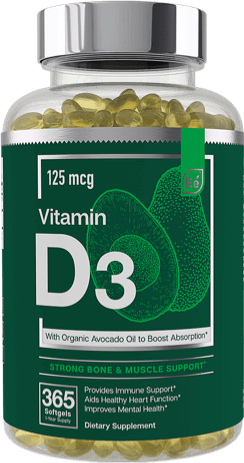 | 1. Essential Elements D3
| View Latest Price → |
Best for depression 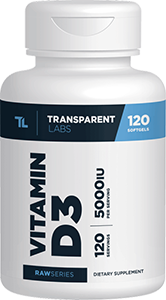 | 2. TransparentLabs RawSeries Vitamin D3
| View Latest Price → |
Best for older adults 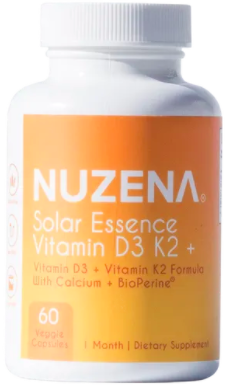 | 3. Solar Essence Vitamin D3 + K2
| View Latest Price → |
Best for the winter 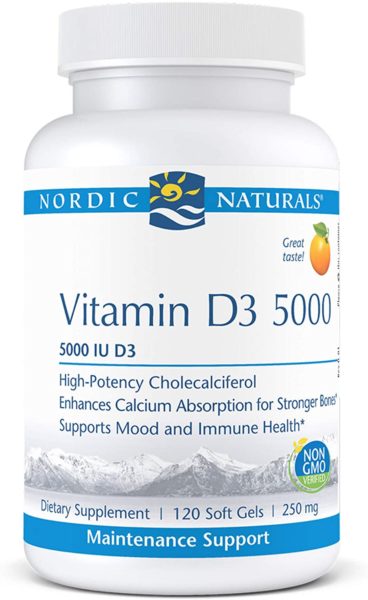 | 4. Nordic Naturals Vitamin D3
| View on Amazon → |
Best for vegetarians and vegans 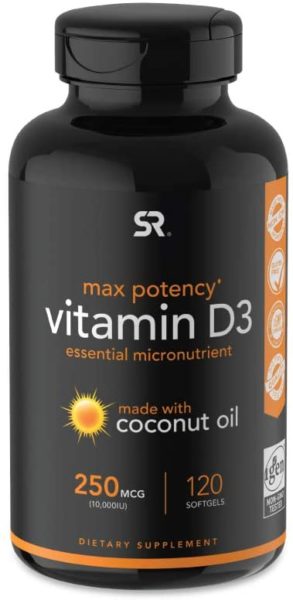 | 5. Sports Research Vegan D3
| View on Amazon → |
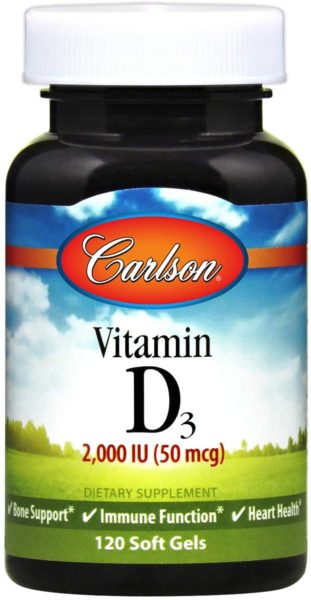 | 6. Carlson Labs D3
| View on Amazon → |
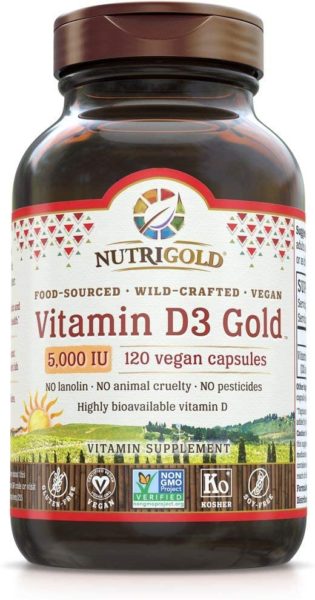 | 7. Nutrigold Vitamin D3
| View on Amazon → |
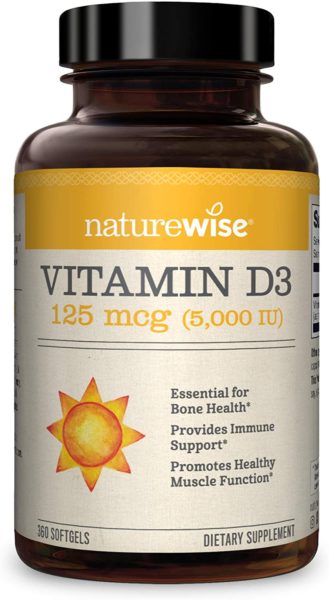 | 8. NatureWise Vitamin D3
| View on Amazon → |
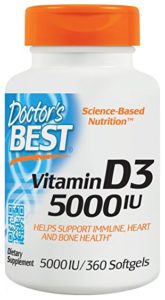 | 9. Doctor’s Best Vitamin D3
| View on Amazon → |
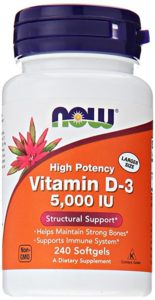 | 10. Now Foods Vitamin D3
| View on Amazon → |
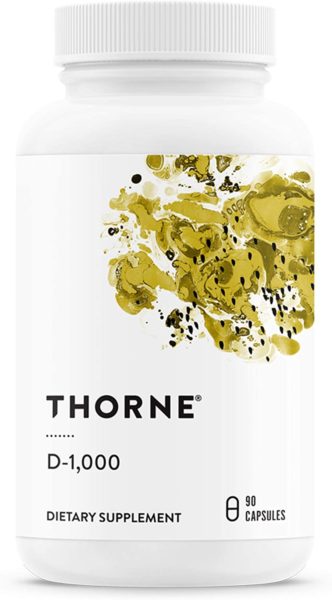 | 11. Thorne Research Vitamin D-1000
| View on Amazon → |
1. Essential Elements D3

Essential Elements gives us the best vitamin D3 supplement on the market. Not only does it contain a generous dose of vitamin D3 (as Cholecalciferol) – that helps to boost bone health, testosterone and heart health – it encapsulates the entire product in heart-healthy organic avocado oil for better absorption and bioavailability.
Essential Elements D3 is completely free of common allergens and contains zero fillers, dyes, additives or preservatives. Every bottle comes packed with a 1 year supply, making it the purest and most convenient vitamin D supplement on the market.
Bodynutrition’s #1 choice.
2. TransparentLabs RawSeries Vitamin D3

Click here for the lowest price
RawSeries Vitamin D3 delivers 5,000 IU of active vitamin D. No artificial sweeteners. No artificial coloring. Gluten-free and non-GMO. No artificial preservatives.
Each capsule packs your daily vitamin D in a gelatin softgel (vegans be aware) with safflower, glycerin, water, and sunflower oil. The plant-based oil carriers ensure you’ll get full absorption. And with 120 capsules in each bottle, you’re good for a full 3 months.
3. Solar Essence Vitamin D3 + K2

Click here for the lowest price
Nuzena’s formula offers a healthy dosage of Vitamin D3, while their formula also includes vitamin K2, calcium and bioperine.
One thing we are pleased to see is the inclusion of Bioperine, a natural stimulant that aids the absorption of nutrients and benefits the body’s metabolism.
We were impressed by Nuzena, who offer a wide range of products that cater for all dietary needs. Providing natural formulas, which are non-GMO, gluten free, vegan-friendly and also produced in FDA registered facilities ensuring quality certification.
Solar Essence Vitamin D3 by Nuzena takes a solid top-3 spot for the best Vitamin D3 supplement.
4. Nordic Naturals Vitamin D3

Nordic Naturals D3 provides a concentrated vitamin D source alongside some of its trademark healthy oils.
Each softgel provides 5000 IU of vitamin D3, dissolved in olive oil and the omega-9 fatty acid oleic acid.
The softgels are flavored with natural orange extract and preserved with rosemary extract, which removes the need for a synthetic preservative to keep the supplement fresh.
5. Sports Research Vegan D3

Sports Research Vegan D3 is one of the few vitamin D supplements on the market that’s derived from plant sources. As you might guess, the capsule is made from plant cellulose.
If plant sources are important to you, this should be your supplement of choice.
6. Nutrigold Vitamin D3 Gold
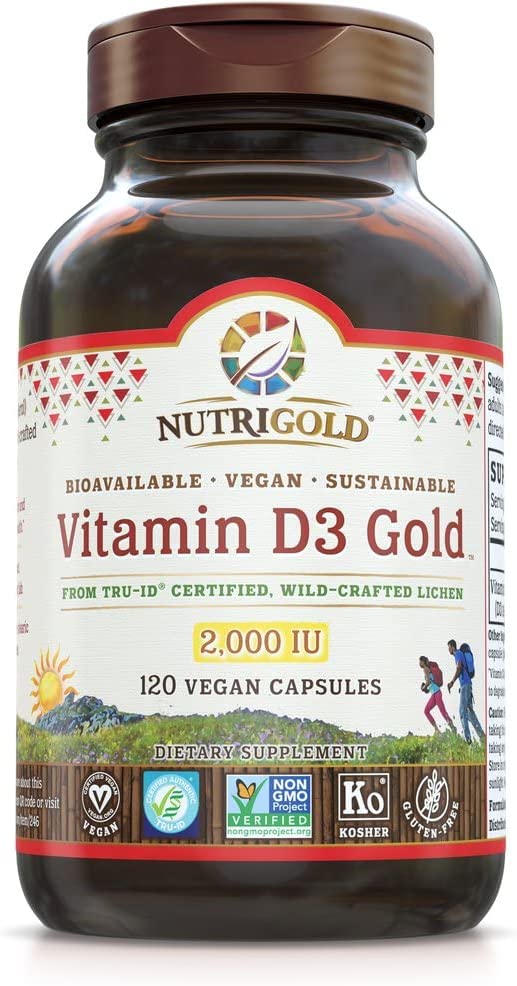
Nutrigold has a strong tradition of quality ingredients for a low cost with a purist, minimalist design philosophy, and that holds true here, too.
One attractive perk that speaks to Nutrigold’s commitment to purity is that, unlike some of its competitors, this supplement is not manufactured on equipment shared with allergens like soy, milk, wheat, or fish.
Unusually, it’s also vegan-friendly, being derived from lichen. If you have allergies to any of these ingredients, getting Nutrigold Vitamin D3 is a good call.
7. NatureWise Vitamin D3

NatureWise D3 has some serious clout: the 5000 IU dosage is great if you have very low levels of vitamin D and are looking to rapidly restore your body to healthy vitamin D levels.
This product appeals to the minimalist, too, as the only ingredients aside from vitamin d are olive oil and the constituents of the capsule (gelatin and glycerin).
8. Doctor’s Best Vitamin D3

Doctor’s Best provides a hefty 5000 IU dosage in this softgel formulation. The supplement formulation is pretty clean, too: the only other ingredients are virgin olive oil, gelatin, and water.
One downside to Doctor’s Best Vitamin D3 is that no independent lab testing is available to assay its purity, so you’ll have to rely on the overall reliability of the brand based on its other offerings.
9. Carlson Labs D3

Carlson Labs delivers a pretty simple supplement, using safflower and corn oil to dissolve the fat-soluble vitamin D3 it contains in a gelatin-based capsule that delivers a moderate dose of 2000 IU of the vitamin.
Carlson Labs drops a bit in the rankings because it uses a less healthy option than olive oil to deliver its vitamin D.
10. Now Foods Vitamin D3

Now Foods is a simple formulation with a middle-of-the-road 1000 IU dosage. The vitamin D is delivered alongside olive oil, inside a gelatin capsule.
The downside? First the dosage is not spot-on, according to independent lab testing. Second, even if it were accurate, other products provide higher dosage and better-sourced ingredients.
Category winners
Best vitamin D overall: Essential Elements D3
With its super-clean supplement design, heart-healthy avocado oil, and potent 5000 IU dosage, Essential Elements D3 is a clear all-around best.
Best vitamin D for bone health: Solar Essence Vitamin D3 + K2
Looking to combat osteoporosis or osteopenia? Solar Essence from Nuzena is the way to go, thanks to its innovative D3 / K2 combo. Both of these vitamins play a critical role in bone health, and indeed, work synergistically to reinforce bone strength.
Best vitamin D for boosting your immune system: Essential Elements D3
Many American adults are deficient in vitamin D, and getting your vitamin D levels back up to the healthy range should be your top priority if you want to boost your immune system. That’s why the high dose of vitamin D3 provided by Essential Elements D3 is the best pick for boosting immunity.
Best vitamin D for depression: Transparent Labs Vitamin D3
Vitamin D-based treatments for depression rely on high doses of very pure supplements, making Transparent Labs’ ultra-clean supplement design an ideal choice.
Best vitamin D for older adults: Solar Essence D3 + K2
Solar Essence delivers a solid 5000 IUs of vitamin D3, and in addition, it delivers 80% of your vitamin K2 needs for the day, which is a micronutrient that’s often lacking in older adults, making it an easy winner in this category.
Best vitamin D for vegetarians and vegans: Sports Research Vegan D3
Finding true vegan vitamin D3 is tough, but Sports Research has managed to come up with a powerful vitamin D3 supplement that is coconut-oil based. It’s definitely the best choice if you want to avoid animal ingredients in your vitamin D3 supplement.
Who should buy vitamin D?
Unless you live in the tropics and get ample sunlight during the year, you’re likely to have at least some time during the year where your natural exposure to vitamin D is suboptimal. There are a few groups of people who should be especially keen to take a vitamin D supplement:
People who live in northern climates. For obvious reasons, people who live further from the equator get less sunlight, especially during the wintertime. They aren’t outside much, since it’s cold, and when they are outside, their skin is mostly covered.
People with darker skin. The darker your skin color, the more sun exposure you need to synthesize adequate amounts of vitamin D. If you have darker skin, even in fairly temperate climates you might not be getting enough sun exposure to have high vitamin D levels naturally.
People who work nights or who spend a lot of time indoors. Even people who live in warm climates can be prone to vitamin D deficiency if they spend most of their time indoors and cover up with sunscreen when they are outdoors.
Older adults. The final group that should strongly consider vitamin D supplementation is older adults.
Older adults are at a notably higher risk of vitamin D deficiency, though it’s unclear whether this is merely the result of spending more time indoors than their younger counterparts, or the result of changing hormonal biology as you get older.
Regardless, given the potential associations between low vitamin D levels and a huge range of health problems that afflict the elderly, a vitamin D supplement is a smart idea.
How we ranked
Since vitamin D is such a popular supplement, we started with dozens of potential candidates for our rankings, then evaluated them using the following criteria.
Effective dosage for a broad range of health benefits. Our first priority was dosage: each capsule (not each serving) had to offer at least 1000 IUs of vitamin D.
As things currently stand, professional medical association recommendations are 600 IUs per day for adults, and 800 IUs per day for the elderly (1). But many scientists have called for these recommendations to be increased, as evidence accumulates that higher levels may be necessary for optimal health. That’s why we required at least 1000 IUs for a product to make ur rankings.
Independent lab testing of dosage. Beyond the reported dose on the label, we also cross-checked independently verified metrics of the actual dosage delivered by the capsules.
We dropped any supplements whose reported dose differed wildly from its actual dose, especially if it was delivering less vitamin D than advertised.
Highly bioavailable formulation. We also required that vitamin D supplements deliver their vitamin D in some type of lipid (fat) solution.
Vitamin D is fat-soluble, so unlike water-soluble vitamins like vitamin C, its absorption could theoretically be adversely affected if it isn’t already dissolved in some kind of fat.
We had a strong preference for supplements that used a high-quality oil like virgin olive oil, versus a cheap and less-healthy option like safflower oil.
Clean supplement design. Finally, among the remaining supplements, we favored those without added sugar, binders, and fillers.
Synergistic bonus ingredients. In most cases, we stuck with pure vitamin D. However, in a few cases there were additional ingredients that interact synergistically with vitamin D, like the omega 3 fatty acids found in Nordic Naturals Vitamin D and the vitamin K2 in Nuzena Solar Essence D3 + K2. We rewarded products like these that leveraged these special interactions.
FAQ
Q: Can low vitamin D lead to weight gain?
A: There is strong evidence that vitamin D is related to being overweight or obese, but whether vitamin D deficiency will cause you to gain weight is less clear.
One study published in 2013 makes the opposite case: being overweight or obese disrupts hormone metabolism, which manifests as vitamin D deficiency (1).
This paper, which used genetic markers for vitamin D metabolism to study the causal effects of vitamin D on obesity, and vice versa, argues that obesity causes vitamin D deficiency, not the other way around.
From the perspective of preventing the negative health effects of vitamin D deficiency, the distinction is less important, as in either case people who are already overweight or obese may require vitamin D supplementation.
Q: What causes vitamin D deficiency?
A: The most proximal cause of vitamin D deficiency is a lack of exposure to enough sunlight for your body to synthesize vitamin D, or a lack of vitamin D in your diet.
Dietary vitamin D is very rare; it’s only found in significant amounts in fortified foods, and some mushrooms (which, incidentally, synthesize it the same way we do—by exposure to sunlight). So, if you are not getting outside and exposing your skin to direct sunlight, that’s the most likely cause of vitamin D deficiency.
Q: Are overweight and obese people at greater risk for vitamin D deficiency?
A: Being overweight or obese seems to amplify the problem of vitamin D deficiency through disruptions in the body’s hormonal system, so even given the same amount of sun exposure, an overweight or obese person is more likely to develop vitamin D deficiency.
Q: What does vitamin D do?
A: While named a “vitamin,” vitamin D is technically a hormone. It plays a critical role in skeletal health, and deficiencies in vitamin D (which go hand in hand with calcium deficiencies) are associated with a marked increase in risk for osteoporosis.
It also play a key role in metabolising other nutrients like magnesium too. Discoveries of its biological roles are still continuing to this day; it seems to play a link in both cognitive function and athletic performance as well.
Q: Is low vitamin D linked to depression?
A: Yes, one of the most under-reported threads on the science of vitamin D is its link to mental health. According to research that examined data from over 30,000 people, people with low levels of vitamin D have a more than two-fold increased risk of depression, compared to people who have high levels of vitamin D (2).
Among people with fibromyalgia, deficiency in vitamin D is also linked to anxiety as well as depression (3). While there are not as many randomized clinical trials of vitamin D for depression as there are for bone health and fracture prevention, the role of vitamin D in mental health should not be overlooked.
Related articles
Recap
Vitamin D plays a critical role in the development and maintenance of good bone health, and evidence is accumulating that demonstrates a role in promoting heart health, longevity, and athletic performance, to name just a few other benefits.
It’s naturally synthesized by your body via exposure to sunlight, but in the modern world, many people are vitamin D deficient.
Groups at particularly high risk for vitamin D deficiency include people with darker skin, people who live in northern climates, and older adults.
Given the good safety profile of vitamin D and the wide range of detrimental effects associated with deficiency, you should seriously consider a vitamin D supplement if you don’t expose your skin to the sun on a regular basis throughout the year.
For BodyNutrition’s #1 recommended vitamin D supplement, click here.